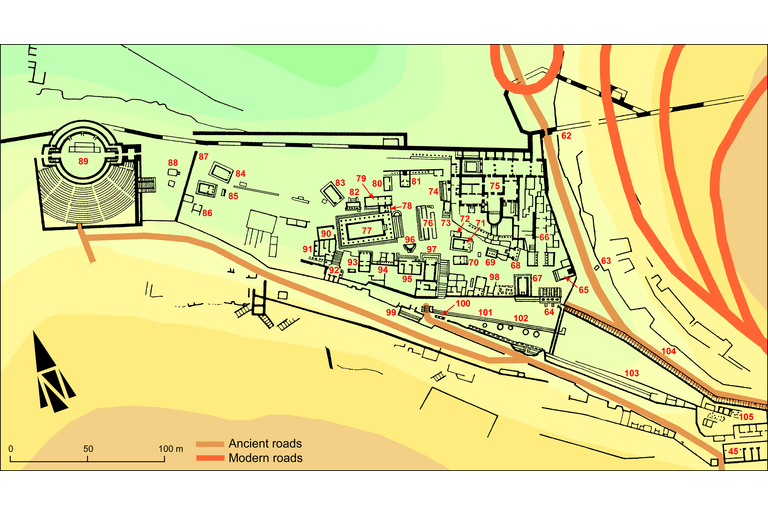Honorary inscription for king Ptolemy VIII Euergetes II
IGCyr015300
Trismegistos ID: 5991
Source Description
Repository
Cyrene Museum, inv. number unknown.
Support
White marble base, later re-used, as shown from two deep attachment holes on former lower side; broken off at right lower angle and also slightly at right upper angle (0.76; 0.22;0.57).
Layout
Originally inscribed on the whole surface.
Letters
0.025; some of the alphas have a dropped bar and phi has a very flat loop.
Place of Origin
Findspot.
Date
Between 145 and 116 B.C. (reign)
Findspot
Found before 1930 at Cyrene pleiades; HGL : in the North-East area of the Sanctuary of Apollo .
Last recorded Location
Seen by C. Dobias-Lalou in 2001 in Shahat : outside Cyrene Museum .
Text constituted from
Transcription from stone (CDL).
Bibliography
Oliverio, 1932-1933 Oliverio, G., 1932-1933, Documenti antichi dell'Africa Italiana, I, fasc. 1-2, Bergamo - see in bibliography , pp. 69-70, n. 6, whence SEG Supplementum Epigraphicum Graecum, Leiden, then Amsterdam, 1923-1971, then 1979- - see in bibliography , 9.52. Cf. Laronde, 1987 Laronde, A., 1987, Cyrène et la Libye hellénistique. Libykai historiai de l’époque républicaine au principat d’Auguste, Paris - see in bibliography , p. 453, footnote 228; Lanciers, 1988 Lanciers, E., 1988, Die Alleinherrschaft des Ptolemaios VIII. im Jahre 164/163 v. Chr. und der Name Euergetes, in B.G. Mandilaras (ed.), Proceedings of the XVIII International Congress of Papyrology, Athens 25-31 May 1986, II, Athens, 405-433 - see in bibliography , pp. 431-433, whence SEG Supplementum Epigraphicum Graecum, Leiden, then Amsterdam, 1923-1971, then 1979- - see in bibliography , 38.1671; Savalli-Lestrade, 2009 Savalli-Lestrade, I., 2009, Usages civiques et usages dynastiques de la damnatio memoriae dans le monde hellénistique (323-30 av. J.-C.), in S. Benoist, A. Daguet-Gagey, C. Hoët-van Cauwenberghe, S. Lefebvre (eds), Mémoires partagées, mémoires disputées: écriture et réécriture de l'histoire, Metz, 127-158 - see in bibliography , pp. 145, 156, whence SEG Supplementum Epigraphicum Graecum, Leiden, then Amsterdam, 1923-1971, then 1979- - see in bibliography , 59.1958.
Text
Apparatus
6 〚[------] 〛 : Oliverio, 1932-1933 Oliverio, G., 1932-1933, Documenti antichi dell'Africa Italiana, I, fasc. 1-2, Bergamo - see in bibliography 〚[---] λ̣ε̣[---] 〛
French translation
(Statue) du roi Ptolémée, dieu Evergète, fils du roi Ptolémée et de la reine Cléopatre, Dieux Epiphanes, (consacrée par) [noms martelés].
English translation
(Statue) of king Ptolemy, god Euergetes, son of king Ptolemy and queen Cleopatra, Gods Epiphaneis, (dedicated by) [erased names].
Italian translation
(Statua) del re Tolemeo, dio Evergete, figlio del re Tolemeo e della regina Cleopatra, Dèi Epifani, (dedicata da) [nomi martellati].
Commentary
E. Lanciers has argued that a date as early as 163 is also possible because of the epithet Euergetes, which he shows to have been chosen in 164/3.
The traditional view is that when king of Cyrene, i.e. from 163 to 145, Ptolemy was mentioned in Cyrene without epithet, whence the date 145/116 traditionally assigned to this and four other Cyrenaean inscriptions (so Laronde, 1987 Laronde, A., 1987, Cyrène et la Libye hellénistique. Libykai historiai de l’époque républicaine au principat d’Auguste, Paris - see in bibliography , p. 453, footnote 228).
In the latter view, the erased lines contained the name and title of the dedicants and possibly the reason of the dedication.
If Lanciers is right, the erasure might have cancelled the name of one of both associate kings during the troubled period ending with Ptolemy's will (163-155; cf. IGCyr011200).
Creative Commons Attributions-NonCommercial 4.0 International License.
All citation, reuse or distribution of this work must contain a link back to DOI: http://doi.org/10.6092/UNIBO/IGCYRGVCYR and the filename (IGCyr000000 or GVCyr000), as well as the year of consultation.
